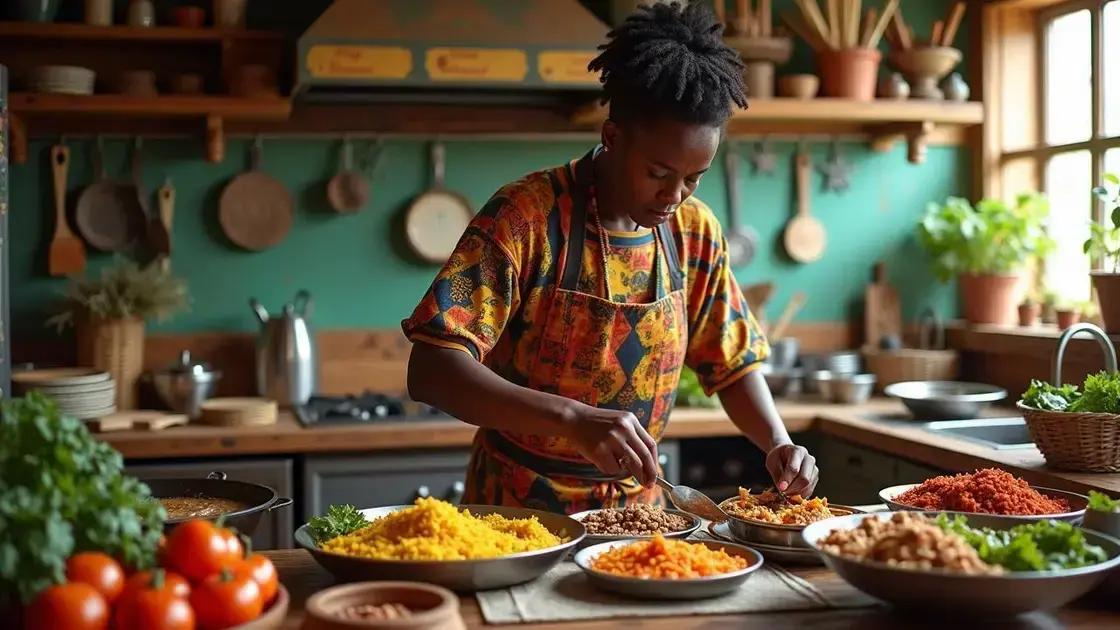When considering African recipes, it’s important to understand the risks involved, such as potential allergens and food safety issues. Practicing good hygiene, sourcing fresh ingredients, and cooking thoroughly can help ensure a safe and enjoyable culinary experience.
Are there risks with the African Recipe? As global interest in African cuisine grows, it’s crucial to understand the potential risks involved. From ingredient sourcing to cooking methods, this culinary journey can be both exciting and fraught with challenges. In this article, we will explore the unique aspects of African recipes while emphasizing safety and awareness. You’ll learn the potential risks and gather essential tips to enjoy these flavors safely.
Understanding the Risks Involved with African Recipes

Understanding the risks involved with African recipes is essential for anyone looking to explore this diverse and rich culinary world. Ingredients can vary widely in terms of their availability and safety. Some ingredients may not be commonly found in local stores, leading to the use of substitutes that might alter the dish’s intended flavor profile or introduce allergens.
Food Safety Considerations
When trying new African recipes, understanding food safety is vital. Cross-contamination can occur if proper hygiene is not followed, especially in areas with less stringent food handling standards. Always wash your hands, utensils, and surfaces thoroughly.
Potential Allergens
Some dishes may contain nuts, seeds, or spices that can trigger allergies. It’s important to read recipes closely and inquire about ingredients when dining out. If you’re preparing the dishes at home, consider testing small amounts of new ingredients first to assess your tolerance.
Traditional cooking methods used in African cuisine, such as slow cooking or fermentation, could also pose risks if not followed properly. These processes require attention to detail to prevent foodborne illnesses.
Regional Variations
African recipes vary greatly by region, and local customs may affect the use of certain ingredients. For example, a dish popular in one area may be considered unsafe in another due to differing practices around sourcing and storing food. Always research the specific regional cuisines and their associated risks.
Being informed about these factors will enhance your culinary experience and help you enjoy the diverse flavors African cuisine has to offer. Stay aware, and don’t hesitate to ask questions about the dishes you’re interested in.
Safety Tips for Enjoying African Cuisine

Enjoying African cuisine can be a wonderful experience, but it’s important to prioritize safety. Here are some essential tips to help you enjoy these dishes without risk.
Research Authentic Ingredients
Before trying a recipe, research the ingredients to ensure you can find safe and authentic options. Knowing what to look for helps avoid substitutions that may cause allergies.
Source Fresh Ingredients
Always purchase fresh ingredients from reputable sources. Whether you are at local markets or grocery stores, check for quality and expiration dates to ensure you are using safe food.
Practice Good Hygiene
When preparing African recipes at home, practice good hygiene. Wash your hands thoroughly and regularly, and keep all cooking surfaces clean to prevent cross-contamination.
Cook Thoroughly
Ensure that food is cooked thoroughly. This means reaching the appropriate internal temperatures for meat and seafood to eliminate harmful bacteria. Use a food thermometer when necessary.
Taste Small Portions
If you are trying a new dish, consider tasting a small portion first. This allows you to gauge any potential allergies you may have before consuming larger amounts.
Be Cautious at Restaurants
When dining out, ask the staff about ingredient sourcing to ensure your meal meets your safety standards. Don’t hesitate to ask if the restaurant considers food safety practices seriously.
By following these safety tips, you can enjoy the diverse and delicious world of African cuisine with confidence and peace of mind.
In Summary: Enjoying African Cuisine Safely
Exploring African cuisine can be an unforgettable culinary adventure filled with diverse flavors and rich traditions. However, understanding the risks and practicing safety are essential to fully experience this vibrant food culture.
By being aware of ingredient safety, practicing proper hygiene, and following responsible cooking methods, you can ensure a safe and enjoyable experience with African recipes. Whether cooking at home or dining out, prioritizing safety enhances not only your health but also your appreciation for these unique dishes.
Embrace the flavors, learn from the process, and savor the culinary journey while keeping these safety tips in mind. Happy cooking!
FAQ – Frequently Asked Questions about African Cuisine
What are some common risks when trying African recipes?
Common risks include allergic reactions to unfamiliar ingredients, foodborne illnesses from improper cooking, and cross-contamination.
How can I ensure the safety of African ingredients?
Always buy fresh ingredients from reputable sources, check for quality, and research unfamiliar ingredients before use.
What hygiene practices should I follow when preparing African dishes?
Practice good hygiene by washing your hands regularly, using clean utensils, and ensuring all cooking surfaces are sanitized.
How do I know if I’m allergic to specific African food ingredients?
If trying a new dish, taste a small portion first to assess any reactions before consuming larger amounts.
What should I ask when dining at a restaurant serving African cuisine?
Inquire about ingredient sourcing, cooking practices, and any potential allergens to ensure your meal meets your safety standards.
Are there any particular dishes I should avoid if I have dietary restrictions?
It’s essential to research specific dishes or ask restaurant staff about ingredients to ensure they align with your dietary needs.













